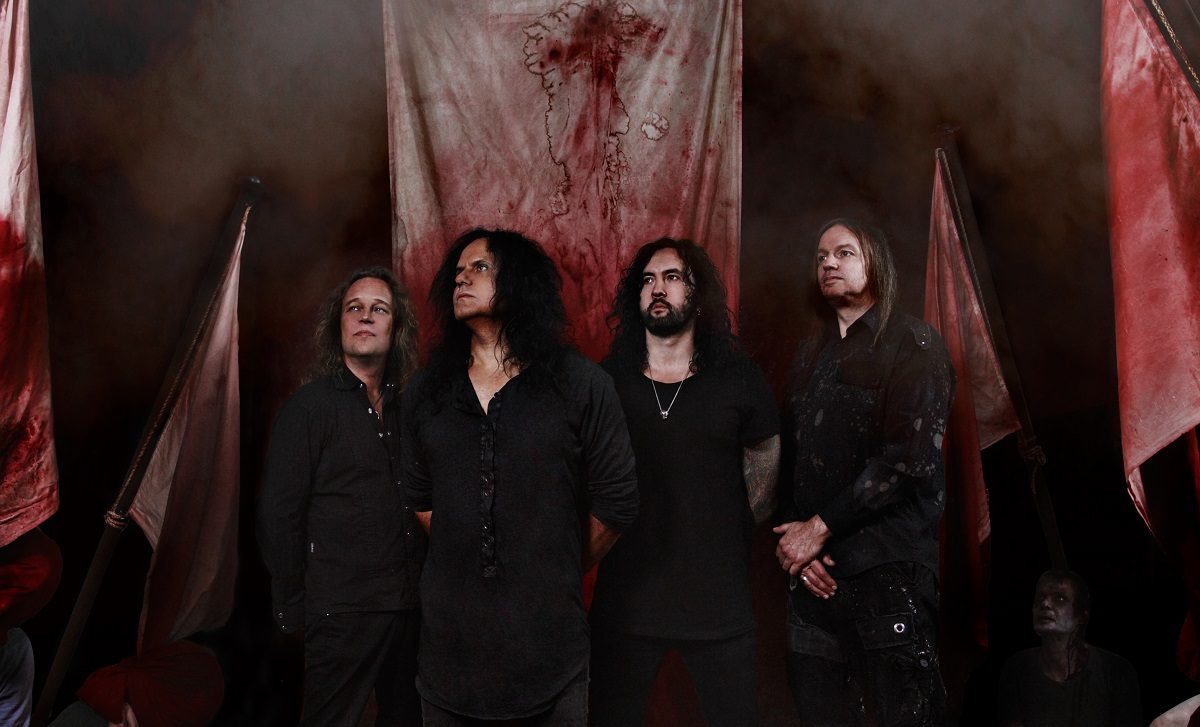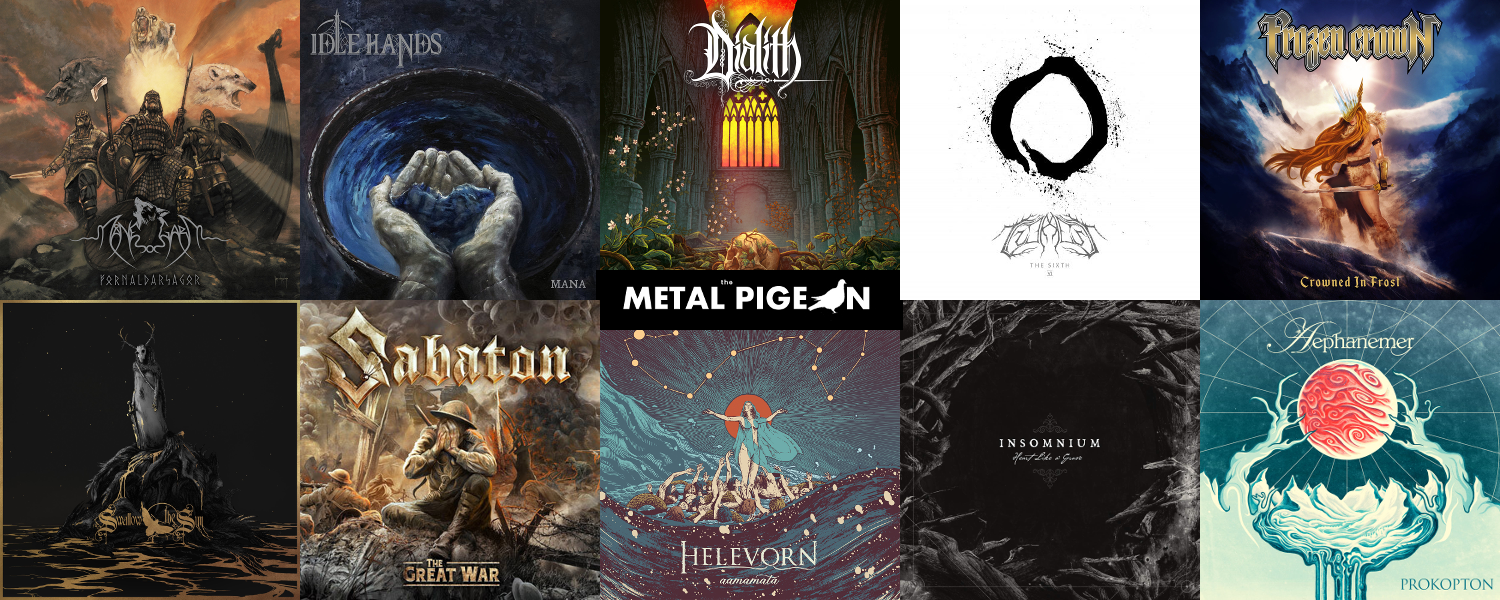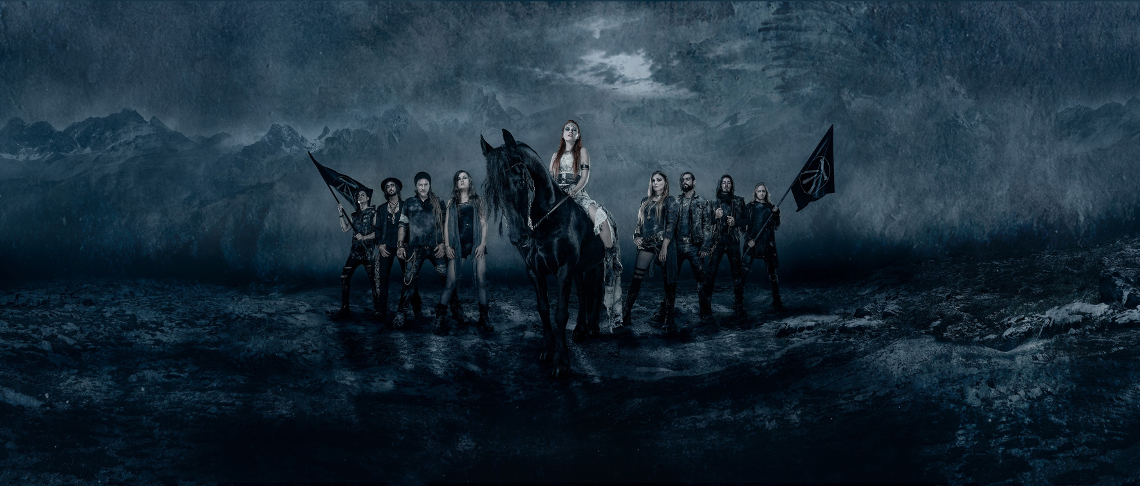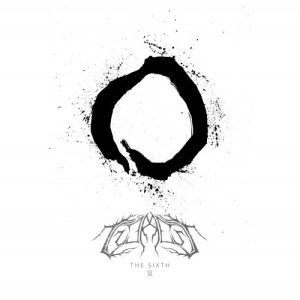There has been a handful of new albums that have shook me over the past month and a half that have come across my desk, and I mean literally. These all lean towards the heavier, extreme end of the metal spectrum, and I guess that’s just what I’ve been really into here lately as the brutal summer months arrive to envelope us in oppressive, withering heat. There’s the new album by leathered veterans Kreator after yet another lengthy five year wait, and a new album by Thormesis who were a band that I was pretty nuts over back in 2019 with their last album, and an armful of new records from band’s I’m entirely new too which is always encouraging. I haven’t been to any metal gigs since the last update, but there’s a bunch of tours coming up that are really tempting to buy tickets to, and I slated to see Moonspell and Swallow the Sun in late August which will also be my return to one of my favorite venues in town. It’s been also fun to check out some of the Hellfest footage on the YouTube ARTE channel, and the way they’ve segmented upcoming band’s performances as save-able video premieres is really convenient and something I’d hope other fests like Wacken would adopt (having to tune into a singular livestream feed seems like something that should have changed a few years ago now, our entertainment is literally all on demand now). Seeing Blind Guardian finally perform all of Somewhere Far Beyond was a treat to behold, I never thought we’d get to hear “Ashes to Ashes” live for starters. Although I can’t really imagine physically surviving going to Hellfest even for one weekend, let alone both, it’s nice to feel a part of this massive event from the comfort of one’s desk or couch. Anyway onto the reviews, and drop a line in the comments section on how you are all handling hell on ear— I mean summer! Yay… summer.
Kreator – Hate über alles:

Maybe it was the context of when I first checked out this album that really sold it for me, right after a particularly frustrating and exhausting day at work while driving in search of a tasty iced coffee on an afternoon where my car thermometer read 105°F. In that state of hellish existence, I really enjoyed the heck out of Hate über alles, tapping in rhythm on my steering wheel and pounding the passenger seat next to me for emphasis, but even now, some time later while listening to it at my desk, I think this album holds up to that initial positive impression. This is leagues better than 2017’s decent but sometimes flat Gods of Violence, an album that did not live up to the hype that 2012’s melodic death infused Kreator inspired with the truly excellent Phantom Antichrist. There’s a fire and intensity to Mille Petrozza that seemed missing from the last one, both in his lyrics and his impassioned vocals, not to mention some of the strongest songwriting they’ve delivered since Violent Revolution. It’s been interesting to see the varying opinions I’ve seen on this album, and as someone pointed out on a review in Metallum, there’s really no winning for legendary bands releasing new music. Fans want the band to recapture the essence and energy of a bygone era, and also want something new and fresh to the band’s sound so that it doesn’t sound like something they’ve heard before. I’ve seen some people complain about the lingering injection of melodeath in the Kreator sound over the past two albums post Phantom, and that’s puzzling to me, because as on “Strongest of the Strong” here, I think they’ve done a fantastic job at infusing that into their classic thrash sound. In fact the more melodic Kreator allow themselves to be, the richer and deeper their songwriting strikes me, with this album’s best cuts being those that allow for Sami Yli-Sirniö’s articulate lead melodies to flow over the top of Petrozza’s ever reliably crunchy riffing. This isn’t a deep dive review so while I won’t track by track it, I’ll point out “Demonic Future” (love that Maiden-y riff in the chorus), “Conquer And Destroy” has a gorgeous intro melody and rips into the most Kreator-y assault on the album, and I love the marching drive of “Crush the Tyrants” despite everyone complaining that it sounds like Sabaton (hey last time I checked, Sabaton didn’t invent the mid-tempo, just saying… where is everyone hearing this supposed Sabaton reference? Get real people…). This is a quality Kreator album for anyone willing to embrace it, quality songs, a mix of their classic sound and newer melodeath update, and Mille sounds like he’s reinvigorated from a lyric perspective.
Einvigi – Yö kulje kanssani:

I enjoy some atmo-black, but it’s rare that I recommend any records from that subgenre here on the blog, mostly because I tend to come to these albums far later than their initial release via recommendations from people or Spotify and by that time it’s a moot point. But I’m arriving right on time with Finland’s Einvigi and their late April release, Yö kulje kanssani. This is a refreshingly light on it’s feet, almost airy yet still substantial atmo-black record that reminds me more of stuff like Steven Wilson and weirdly enough, The Cranberries (musically) than it does Alcest or any of the French pioneers of this particular subgenre. Einvigi’s approach to guitars certainly come bearing riffs with dissonant tremolo passages and heavily distorted fuzzy wash (particularly that Alcest-ian effect of sounding like its coming over some distant fog-covered hill) but their real charm is heard in their jangly, strumming approach. Maybe its just my own individual point of reference, but I can’t help but hear other non-metallic influences shining through here, and my own filter is really clocking a lot of early 90s alternative sounding guitar melodies (I swear the intro to “Takauma” sounds like it could’ve been something from Everybody Else Is Doing It, So Why Can’t We?). The Smiths, Stephen Street’s production style… maybe even a little Smashing Pumpkins circle 92-96 — these are the sounds that I’m hearing when I play through Yö kulje kanssani, and there’s a warm nostalgic comfort to that. Maybe that’s why despite being a big fan of several Alcest records, and a few other atmo-black bands and albums here and there, its always leaning towards more of an appreciation of their objective qualities. Meaning that they’re albums I loved listening to because they were loaded with ear candy or just remarkable musical artistry. But I’ve been replaying this Einvigi album because it’s cutting a little deeper than those others, songs such as “De Profundis” and “Hirviöiden valtakunnassa” filled with the kind of watercolor beauty of Countless Skies’ Glow. But it’s somewhat futile to point out a killer song here, because this really is one of those recordings where its all meant to be a greater whole, to be digested at once so you fall under it’s spell and find that your emotional state is affected and your mood altered. It’s the kind of album you can describe as high art and primal all at once.
Thormesis – If Mania Never Ends:

Thormesis are back after delivering one of 2019’s best albums of that year in The Sixth, a reformation of their older style into something fresh and new that was at once blistering and full of rage and also pensive and melancholic. It’s sequel picks up where it left off, this time incorporating clean vocals in more lead vocal moments as opposed to just serving as a counterpoint to harshes and some peppered in melodeath growls. I’m not sure when the band started describing their sound as “atmospheric metal”, but that descriptor definitely fits for If Mania Never Ends as well as it’s predecessor. The Harakiri For the Sky adjacent soundscapes we got on The Sixth have been pushed over a bit for the introduction of a Finnish inspired, almost Insomnium-esque approach at times. The moody, somber epic “Still the Claim” is the most vivid sample of this infusion, and its smartly paced not to linger too long in one specific passage or another before jumping off to the next. It seems like this is a heavier album than The Sixth in terms of extremes, it’s sonic peaks such as “Cold and Soundless” and “You Are the Parting” having a fiercer, sharper attack than anything on the previous album where the main focus was all-encompassing atmospherics. One of Thormesis most fascinating aspects is how they blur the lines between black metal and melodeath death metal, being neither one and yet reflecting aspects of both styles. On the incredibly emotive “Anemone” you can hear this in the grinding stomp of that introductory verse passage with it’s melodeath assault and how it transitions gradually over the next few minutes into brightly lit progressive metal with black metal vocals underpinning things. At their most inspired, Thormesis manage to paint not so much with the watercolors of Einvigi, but with more primal streaks of raw emotion in violent, ugly, and also gorgeous fashion. This is definitely a progression of their sound, and although I prefer it’s predecessor for the meditative quality that album had as a whole, this is a worthy continuation of that sound.
Gladenfold – Nemesis:

This was a random stumble upon in the bowels of Spotify, a new to me melodic death metal band from Finland who are a surprising mix of Children of Bodom keyboard dramatics driven melo-death (with harshes that remind me of Alexi Laiho’s phrasing but a little more tightened up on the delivery) swirled together with a dose of rather convincing power metal ala Kamelot or classic era Sonata. Their secret weapon in this is that vocalist Esko Itälä is apparently capable of doing both with real skill, his harshes plenty satisfying on a purely sonic level and his clean power metal vocals possessed of a clear, deep, sonorous timbre. At times his singing voice reminds me of a deeper Matthew Corry of UK symphonic power metallers Fellowship, and that might be a random reference but there’s something to the way both of these singers can deliver earnest expressions in their approach to a vocal melody. Gladenfold’s merging of Finnish melodeath and power metal really comes loaded with some major early 2000s vibes, and also plays right into my wheelhouse, but what made me instantly hooked on Nemesis is just how artfully they’ve combined these elements together. Take for example the quick, blistering transitions from melodic to brutal and vice versa on the awesome “Chiara’s Blessing”; or the intensity of that ultra densely packed melodeath riffing on “Revelations” as a bed for Itälä’s harsh/clean switch ups in the verses. The songwriting throughout Nemesis feels well thought out, full of depth and intricate passages that more often than not do venture interesting roads, towards satisfying hooks in the refrains or really monumental musical peaks and valleys. The tucked away gem that really won me over was the Blind Guardian meets modern day Borknagar merger happening in “Tapestry of Creation”, where a beautiful acoustic build up explodes into something that would’ve sounded at home on Winter’s Thrice. I also have a soft spot for the ballad “Saraste” which evokes the best of Suidakra’s indulgent acoustic vibes with the aforementioned Blind Guardian’s bard-esque legacy of balladry into a beautiful piece of music that is the kind of thing you should wish someone would be playing live at the Renaissance festival. Gladenfold have been around for more than a few years (a 2014 debut but they’ve been a thing since 2004!) and it seems like most people are discovering them with Nemesis (their third album) like myself. Looks like I have some homework listening to do.
The Spirit – Of Clarity and Galactic Structures:

Relative newcomers, Germany’s The Spirit are a black metal duo that offer a refreshing take on mining the genre, not through the classic second wave mold of hyperspeed tremolo buzzsaw guitars and a battery of blastbeats, instead opting for a more dynamic songwriting approach that evokes Satyricon’s post-2000’s midtempo output. The first thing that struck me when listening through this album for the first time was just how much I was getting Now, Diabolical vibes not only from vocalist MT’s (no real name provided) very Satyr-esque vocal tone of charcoal black grit and hoarseness, but from the duo’s resolve to stick to a steady, mid-tempo pace as the centering focus of most of these songs. I suppose one could point out that their two man nature also naturally evokes comparisons to Satyr and Frost, but there’s plenty of two man black metal outfits out there, and few if any have taken to tapping this particular style of black metal as a source of inspiration (which is puzzling, but works to The Spirit’s advantage in sticking out from the pack). I should emphasize that this isn’t a purely copycat situation either, The Spirit blending that source of inspiration with complex layering and enough sudden directional shifts that give me some slight Dissection vibes as well. Take the intro to “Celestial Fire” for example, with a seriously Reinkaos-vibe lead pattern to open things up, only to careen headlong into a downhill frenzied pace that is still locked into a headbanging rhythm, never descending into an indecipherable mess. Drummer MS doesn’t rely on black metal tropes such as blast beats and traditional patterns, preferring to employ unorthodox hits and fills that really give the percussion throughout it’s own personality. Current favorite is “The Climax of Dejection”, where you get a real feel for just how multifaceted and complex their songwriting approach can, mixing traditional metal riffs with black metal sounding bends, chords, and tonality. I also love that MT’s ability to deliver enunciative vocals that are both decipherable lyrically and still bleak as all hell, making the lyrics on this album as much a part of the fabric of the recording from a literal standpoint as well as a textural one. This is a really strong black metal record that is refreshing in how it’s mining a source of inspiration that is relatively untapped, and for how they’re putting their own stamp on it.
Kvaen – The Great Below:

This was a nice surprise, a sufficiently brutal slab of blackened, Dissection-y folk tinged metal that fuses in bits of melodeath, straight ahead death, and finds a way to be really tuneful and unrelentingly aggressive at the same time. Kvaen is a one man project courtesy of one lone Swede named Jakob Björnfot, who according to Metallum is responsible for “everything” on this album. Björnfot isn’t a well known name for anything before this, but hopefully Kvaen changes that because he’s got this style of music flowing through his veins. As a guitarist, his approach seems to favor thrashy, speed driven riffing that’s equal parts Kreator and early, early Metallica. It keeps cuts such as the awesome title track and “Damnation’s Jaw” flowing with a wild, headbanging energy that I don’t normally associate with black metal. Even when he does turn towards a more traditional black metal riff structure as on “Sulphur Fire”, Björnfot seems to have an innate sense of keeping it reigned in, to not resort to cliched hypnotic/droning riff sequences as a crutch — instead he uses tremolo riffing as a spice, a flavoring. I love the simplicity and primal nature of this approach, as on “Ensamvarg” where we get into a meaty, fist pumping riff straightaway with a nice, fat, thundering tail to end the verse. His cinematic songwriting instincts are on full display here, employing keyboard/synth as a subtle coloring in assisting a key change, something that feels more natural than hearing a horribly out of tune keyboard melody distract from everything else around it. I also wanna point out the guitar solo here (and elsewhere throughout the album for that matter), because Björnfot is a damn good guitarist and he has an incredible instinct for knowing when to go for broke and go nuts and when to lean more towards the understated and tasteful as he does here to conclude the song. He’s a really strong harsh vocalist as well, his vocals on the right mix of charcoal with a hint of gravel. There’s a host of guest appearances on this album, some impressive names to boot too, but I’ll let you discover those on your own because truth be told they might be a clever initial draw, but you’ll be hitting repeat because of Björnfot’s songwriting and musicianship alone. Seriously one of the flat out best extreme metal (hard to know what to peg this as, it’s such a mish-mash of subgenres in the best possible way) albums of the year, and a likely contender for winding up on many best albums lists at the end of the year.





















